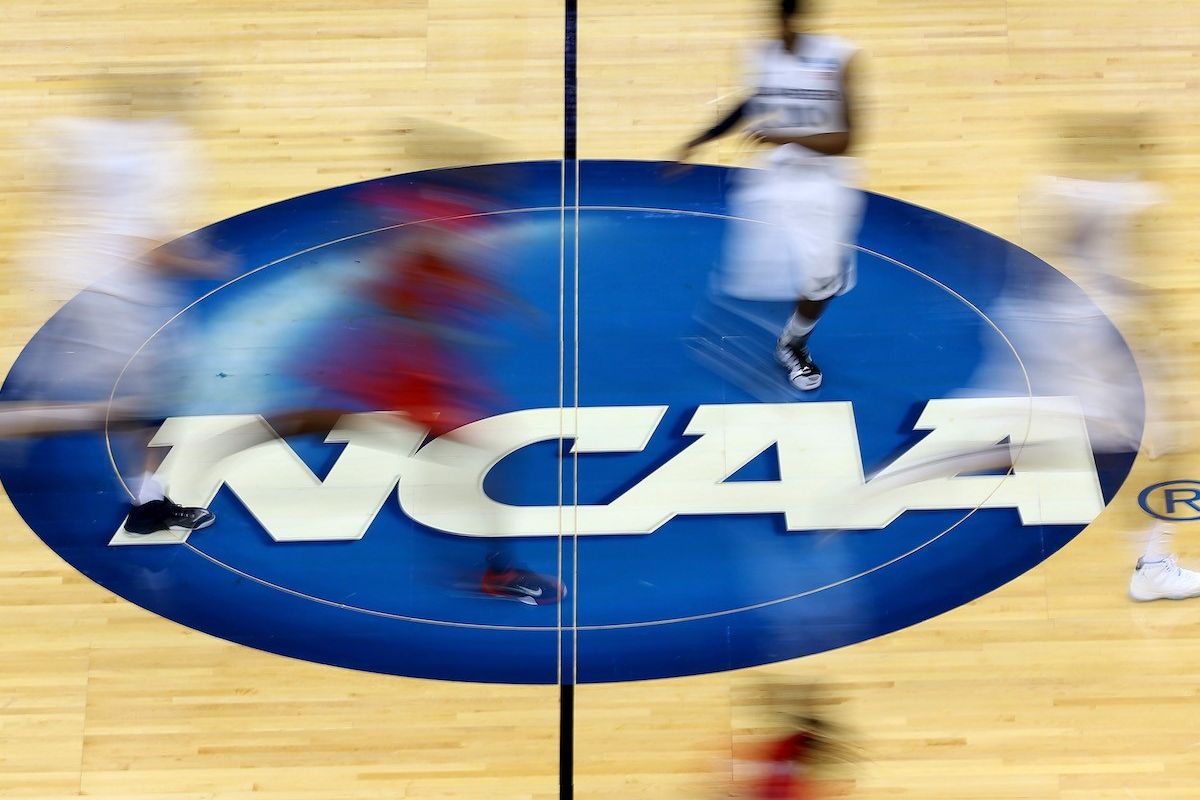
ncaa
during the second round of the 2015 NCAA Men's Basketball Tournament at Jacksonville Veterans Memorial Arena on March 19, 2015 in Jacksonville, Florida.
To continue reading
Create a free account or sign in to unlock more free articles.
By continuing, you agree to the Terms of Service and acknowledge our Privacy Policy
Register
The content is free, but you must be subscribed to Okayplayer to continue reading.
THANK YOU FOR SUBSCRIBING
Join our newsletter family to stay tapped into the latest in Hip Hop culture!
Login
To continue reading login to your account.
Forgot your password?
Please enter the email address you use for your account so we can send you a link to reset your password:

Slavery:a condition compared to that of a slave in respect of exhausting labor or restricted freedom.
As an African American woman, it’s hard to compare an organization to a horrific part of history, but as of late, “slavery” seems to be aligned by many with the NCAA. NCAA has been fighting press, parents and former athletes with many issues such as pay, Title IX and freedom to move as a business partner (which the NCAA operates as) and not just a captive student-athlete obligated by strict contract.
From Spencer Haywood, Ben Simmons, and LeBron James, professional athletes have spoken of their disdain for the NCAA and how they choose to treat student-athletes. Most of us on the outside looking in feel that athletes should be thankful for such a prestigious opportunity to play for an elite school for “free” but what happens when that kid refrains from any type of normalcy that’s experienced by college students and instead treated like a meal ticket for a billion-dollar corporation. A corporation that doesn’t provide student-athletes the right to control their collegiate career, until now… well, a little at least.
Commitments are hard, you know? Especially if you’re a rising NBA star, the only thing on your mind is to not only go to the best school but to receive the best coaching and player position possible to propel you into your professional career, but what happens when the school you committed to isn’t necessarily committed to you? What if you’re outshined by another player and your time is cut or you don’t have the best relationship with your coach? Before, athletes had to either tough the situation out or receive permission from their coaches to contact other schools. but now things are on the mend. Thanks to the Transfer Working Group, who introduced this proposal in 2017, beginning October 15th, schools can no longer block student transfer requests, according to new NCAA rules. This new rule is outlined by a new “notification to transfer model” which means that students are allowed to inform their current school of intent to transfer which is followed by the school entering the student’s name into a national database within two business days allowing for schools to contact students.
What does this mean for coaches? Well, they no longer have room to be selfish. Selfish? What coach wouldn’t want a young athlete to make the best choice for them and their family? Collegiate football favorite, Nick Saban, also media favorite, held nothing back in noting his distaste for the new rule, ““If a guy’s missing class and I say, ‘You’re not going to play because you’re missing class’, which I’ve done on occasion and then he says, ‘Then I’m transferring’… Is that good?” Great point. This new rule now gives students the upper hand and in result could cause coaches to walk on eggshells. But is the rule really that bad or even that great?
Here are 3 things this you need to know:
Yes, this is a win for students, but individual conferences can still make this difficult. Picture this (yes, I said it like Sophia on “Golden Girls”), government and states’ rights are two separate entities. The government can impose a blanket law like the federal minimum wage, but states can choose to either do the federal minimum or pay more. The NCAA is giving a blanket rule statement for schools but divisions can still implement restrictive rules pertaining to transfers within conferences.
Who does this benefit? Hello, top-tier colleges! This makes business boom for NCAA and even gives way for them to somehow start a “college free agency” platform. Mid-level colleges or JUCO can possibly see their best players poached which results in them being in constant recruit mode for their athletes causing them to fear for their own athletic programs.
This could possibly start a hell storm within schools and during the season. While this does give the right for the athlete to choose their own destiny, this could rise selfishness among teammates concerning playing time and shifting focus from a winning season. Coaches now have to focus on maintaining happiness with specific players and in turn, could result in players trying to transfer for petty/selfish reasons. Again, a hell-storm for colleges but money for the NCAA.
No doubt that this is a win for athletes, but ultimately, is this giving them too much rope? Possibly, but we won’t know until its implemented and given a chance. Far too long have institutions controlled the livelihood of these kids they make millions off of; and yes, this new rule seems to now open the can of worms where playing players have hopes of the school keeping them happy. I mean, how else do you keep a high-profile kid from leaving?
At the end of the day, it’s always about money and if it’s anyone entity that understands that concept, it’s the NCAA.
__
Quierra Luck is a Bull City writer whose work has been covered at both the collegiate and professional level of sports and entertainment. Follow her latest and creates adventures at @Quierra_Luck.